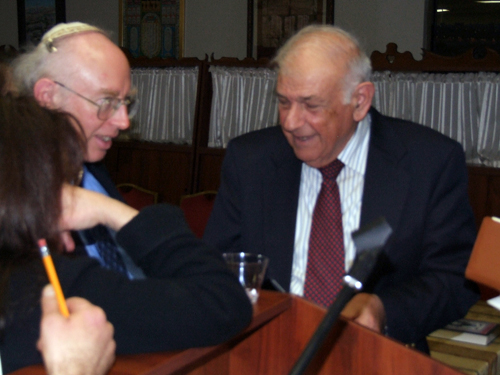
By Donald H. Harrison

SAN DIEGO–The professor who directs the Center for Law and Media at Israel’s Ariel University says the Jewish state must argue its case more vehemently in the courts of law and public opinion, and to do that it must be willing to invest the money it takes to counter propaganda from the Palestinians and their backers in the Arab and Muslim world.
Prof. Abe Sion spoke Monday night, Jan. 27, before an audience of 60 persons at a meeting of the San Diego chapter of the Zionist Organization of America, at which Howard L. Dyckman was re-elected president, Linda Sax treasurer and Harold Reisman secretary. The meeting was held in the small upstairs sanctuary of Chabad at University City.
Sion said that until recently, Israel had spent only $10 million on hasbara — its public relations message — and of that $6 million went to salaries. That amount, he said, is less than many corporations spend on their public relations. Now, he added, the numbers are even worse. He quoted Israel’s consul general in New York, Ido Aharoni, as saying Israel’s public relations budget is only $8 million, with $6 million continuing to go for salaries.
Such an amount is far too little, he said, to counter the unremitting propaganda war on Israel by Palestinians, their Arab and Iranian backers and Jewish leftists. After showing a video of pro-Palestinian demonstrators invading a store in Paris, and emptying from the shelves, without paying for them, every product produced in Israel, Sion likened the Arab propaganda wars on Israel and the Jews to the 1930s when vicious cartoons, and a campaign of singling Jews out for derision, preceded the Holocaust.
Sion, whose university sits in Samaria–beyond the 1949 “Green Line” and within the area often described in the media as the West Bank–said supporters of Israel must refute the argument that the territories captured by Israel in 1967 are “occupied Palestinian lands.” He said when the League of Nations conferred upon Great Britain its mandatory power after World War I, the area called “Palestine” was officially declared a homeland for the Jews as part of that Mandate. The League also created Iraq, Syria and Lebanon as homelands for Arabs.
Britain, said Sion, divided Palestine, giving more than a majority of it away to the Hashemite family of Saudi Arabia, thereby creating today’s Kingdom of Jordan. After World II, the United Nations devised a partition plan for the remainder of Palestine, which the Jews accepted, and the Arabs rejected. The Arab rejection made the plan null and void, he argued. International law, if properly understood, should be that Israel, from the Mediterranean Sea to the boundary of Jordan, is a Jewish state, in which proper care must be taken to protect the rights of minorities who live among the Jews. The 1949 Green Lines were simply lines of the armistice after newly-created Israel defeated invading Arab armies. Contrary decisions by Israel’s Supreme Court and the International Court at the Hague ignored the guiding legal documents, he said.
Those who call a Jewish state an “apartheid” state should consider surrounding states “double apartheid” states because Jews are forbidden to live within them, and there certainly is no protection for the rights of others, Sion said.
A young man who identified himself from the audience as a UCSD student said that as he looked around the room, he noted that the people hearing Sion’s address for the main part were Jews who already were committed to the cause of Israel, whereas pro-Palestinian events often attract large and more diverse audiences. Was Sion not simply preaching to the choir?
Another member of the audience responded that it is to Jews, most of all, that the case must be made, because bit by bit, some Jews have become tired of the public relations pummeling, while those on the left have lent their active support to those who seek to delegitimize Israel.
Sion said that when Arabs say no, they will say no for a hundred years or more, whereas Jews have been willing to cede away their rights in an effort to negotiate. It is Arab intransigence and Jewish pliability, he said, that prompts U.S. President Barack Obama and Secretary of State John Kerry to put inordinate pressure on the Israelis, and little pressure on the Palestinians, to make concessions in the current round of Mideast negotiations.
Because of its fear of Iranian nuclear weapons, and its need for help from the United States to combat them, Israel is more vulnerable to this pressure than it might be otherwise, Sion said.
*
Harrison is editor of San Diego Jewish World. He may be contacted at donald.harrison@sdjewishworld.com
Nice report – really fair and balanced.